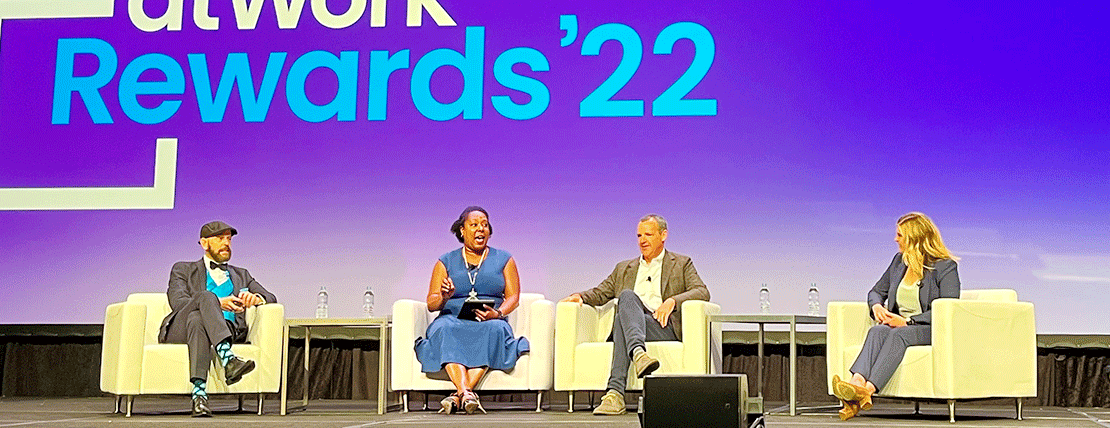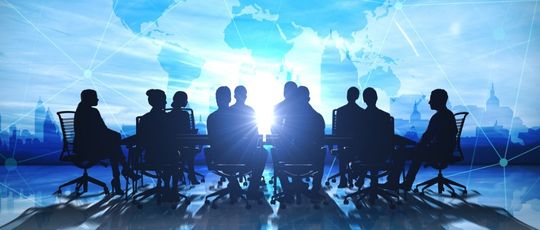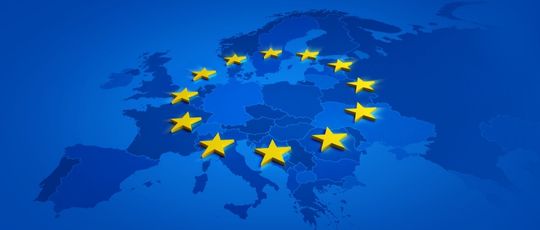The COVID-19 pandemic revealed the significance of the HR function in organizations, and HR and rewards leaders rose to the challenge to successfully navigate the unfamiliar and uncertain landscape.
People have increasingly become the priority, which has led to HR’s having more input on business decisions. With this in mind, a group of HR and rewards leaders at a few of the largest organizations in the United States were part of a panel discussion moderated by WorldatWork CEO Scott Cawood to kick off the second day of the “Rewards ’22” event in Atlanta on Tuesday.
Cawood was joined by Scott Smith, vice president of HR performance systems at Home Depot, Allison Salkeld, director of global well-being at Delta Air Lines, and Malika Terry, vice president of total rewards at UPS. All panelists had unique experiences during the pandemic, given the different industries they operate in.
Terry explained how UPS’ modus operandi before the pandemic was preparing for “peak seasons” which traditionally occurred around the holidays. Lockdowns and less in-person interaction led to an explosion in e-commerce that UPS had to adapt to accommodate rapid increase in delivery demand.
“In March of 2020 we went into a peak season and it hasn’t ended,” Terry said.
Terry expressed her pride in being part of UPS’ ability to be agile and satisfy this increase in demand while also serving its people. However, this has led to a change in mentality when it comes to innovating in rewards across the business.
“The pandemic showed we can do things quickly and differently,” Terry said. “Now let’s bring that same energy back to the people in our organizations. Now that I know we’re capable of this, I’m to demand that. I want to partner with all of the leadership at UPS and do things quicker.”
Smith offered up a similar experience that Home Depot went through during the pandemic as an essential business that remained open. He noted that the company’s sales have grown by $40 billion since the onset of the pandemic — a feat that required an inordinate amount of agility and strategy — and engaged by asking the audience how many people spent time on a home project during the pandemic. (That question was met by some laughter and all hands being raised in the audience.)
Like Terry, Smith emphasized the pace at which Home Depot’s leadership, including himself, had to respond to an increase in demand while balancing the health and safety of its people.
“We had a lot of people concerned about going into the stores to work. But at the same time, we had customers who were going to the store, so we had to figure out how to serve those customers,” Smith said. “We’re having to move more quickly and faster than we have. Our biggest asset is the people in our stores.”
Home Depot was one of many retailers that raised its minimum wages and wages overall for in-store employees, in order to attract and retain workers to meet the rise in demand. Smith said he’s seen his influence expand on budget decisions as the business has become more people oriented, noting a shift in pre-pandemic thinking.
“We’ve really evolved in our thinking around wages as a company. It’s now about what we think we need to spend to create the best associate experience and moving beyond a set budget to work from,” Smith said. “Previously we would relay this information to our CFO and we didn’t always get it, but our CFO and leadership knew what [the amount] was. Fast forward to today, it’s been a huge shift in our role in the process and then our influence in getting what our people need.”
Salkeld offered up a much different perspective than Terry and Smith, as Delta found itself on the opposite end of the demand spectrum once the pandemic hit. The airline company was coming off a record-breaking financial performance in 2019 and had paid out a record-setting bonus amount in profit sharing with its employees just a month ahead of the pandemic.
“Our world changed overnight,” Salkeld said. “Our core tenets of being people-driven and having operational reliability were suddenly table stakes. We had to work quickly to create a space, so our customers would feel we would create a safe travel space for them. The same thing [goes] for our employees. We needed to make sure they would feel safe and confident to provide a great experience for our customers.”
Salkeld noted that Delta didn’t institute any involuntary furloughs but instead granted voluntary retirement offerings as well as time-off programs. While Salkeld’s experience of navigating how to keep the business running and staying people focused differed from Terry and Smith’s experience drastically, the theme of HR and rewards becoming a more integral part of the business was consistent.
Salkeld and the HR function at Delta was tasked with finding unique rewards strategies to drive performance during difficult times so the business could be positioned to accommodate the increase in demand when people began travelling again.
“It’s been a transition from our back-office support function, to be an influencer in business decisions,” Salkeld said. “Our leadership looked to us to think about how we can engage our employees and support them.”
For Delta, Salkeld said the employee value proposition has extended well beyond compensating employees at competitive rates. While that’s still an integral part of rewards, health and well-being components have been critical.
“Employees and potential employees are looking for much more,” she said. “We’ve really homed in on health and well-being as a differentiator. Not just for our employees, but our customers.”
To maintain this seat at the table, the panelists agreed that HR and people leaders will have to be the forward-looking eyes of the organization.
“There’s an intersection between rewards and business acumen,” Terry asserted. “We see what’s on the horizon and we know what’s happening in the industry. It’s time for us to harness that and take it back to our business leaders.”
Terry implored the audience to anticipate needs three to five years ahead so it can inform talent strategy. Data, she said, will play an integral role in supporting this future-focused strategy to sell this strategy.
Smith agreed, saying that Home Depot’s leadership has challenged his team to find the answers to attract and retain talent, because of the status of the labor market. Data, he said, is pivotal in this regard.
“What’s gotten us credibility with our CFO is tying data to decision-making,” Smith said. “We’ve done all the work to put data behind what we’re doing and that’s helped us in convincing leadership when we need to make decisions.”







